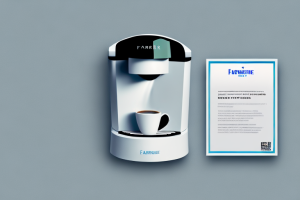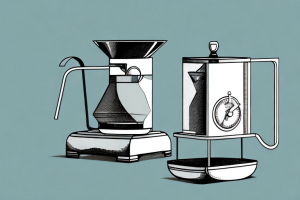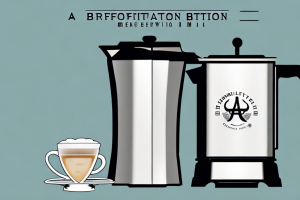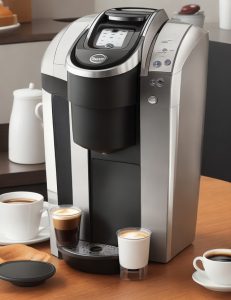Coffee Maker Water Filters

A coffee maker with a water filter attached
Coffee is an essential part of many people’s daily routine. Some people consume it as a morning pick-me-up, while others need it to get through their day. However, what many people don’t realize is that coffee quality is highly dependent on water quality. This is where coffee maker water filters come into play. In this article, we will discuss the importance of using coffee maker water filters, how they work, the benefits they provide, the types of filters available, and how to choose the right filter for your coffee maker.
The Importance of Clean Water for Coffee
The quality of your coffee is heavily reliant on the water you use. Water contains minerals and impurities that can significantly impact the taste of your coffee. Without proper filtration, the water can become too acidic or have an off-flavor, resulting in subpar coffee quality. Clean water not only produces better-tasting coffee, but it also helps to increase the lifespan of your coffee maker. By removing impurities from the water, coffee maker water filters can prevent mineral buildup that can clog your coffee maker and lead to costly repairs or replacements.
Furthermore, using clean water for your coffee can also have health benefits. Impurities in water can include harmful chemicals and bacteria that can be harmful to your health. By using a water filter, you can remove these impurities and ensure that your coffee is not only delicious but also safe to drink. Additionally, using filtered water can also reduce the risk of limescale buildup in your coffee maker, which can affect the performance of your machine and lead to a shorter lifespan.
How Coffee Maker Water Filters Work
Coffee maker water filters work by removing impurities from the water before it is used to make coffee. They use activated charcoal or carbon to absorb impurities such as chlorine, calcium, magnesium, and other minerals that affect the taste and quality of your coffee. As the water passes through the filter, the impurities and contaminants are caught and trapped in the filter. The result is clean, purified water that is ideal for making coffee that tastes great and won’t clog your coffee machine’s inner workings.
One of the benefits of using a coffee maker water filter is that it can extend the life of your coffee machine. When impurities and minerals build up in your coffee maker, it can cause clogs and damage to the machine’s internal components. By using a water filter, you can prevent these issues and ensure that your coffee maker lasts longer.
It’s important to note that not all coffee maker water filters are created equal. Some filters may only remove certain types of impurities, while others may be more effective at removing a wider range of contaminants. It’s important to research and choose a filter that is specifically designed for your coffee maker and meets your water filtration needs.
Benefits of Using Coffee Maker Water Filters
There are several benefits to using coffee maker water filters. Firstly, they help remove the impurities and contaminants in your water, which is crucial in enhancing the flavor of your coffee. Secondly, they help to increase the lifespan of your coffee maker by preventing mineral buildup that can clog your machine. Lastly, they can help save you money in the long run by preventing costly machine repairs or replacements.
In addition to these benefits, using coffee maker water filters can also have a positive impact on the environment. By filtering your water before brewing, you can reduce the amount of plastic waste generated by single-use water bottles or disposable coffee pods. This small change can make a big difference in reducing your carbon footprint and contributing to a more sustainable future.
Types of Coffee Maker Water Filters Available
There are different types of coffee maker water filters available in the market today. The most common ones are activated charcoal or carbon filters, reverse osmosis filters, and ceramic filters. Activated charcoal or carbon filters are the most popular as they are budget-friendly, easy to install, and can remove a wide range of contaminants. Reverse osmosis filters, on the other hand, are more expensive, but they are highly effective in removing impurities from the water. Ceramic filters are another popular option as they are reusable and work by filtering water through their small pores.
It is important to note that not all coffee makers require a water filter. Some coffee makers come with built-in filters, while others do not require one at all. It is recommended to check the manufacturer’s instructions or consult with a professional to determine if a water filter is necessary for your specific coffee maker. Additionally, it is important to regularly replace the water filter to ensure it is working effectively and providing the best quality water for your coffee.
How to Choose the Right Coffee Maker Water Filter
To choose the right coffee maker water filter, you need to consider several factors, such as the type of coffee maker you have, the quality of your water supply, and the type of filter that suits your personal preference. You should also consider the number of cups you typically make, as some filters can only purify a limited amount of water. It’s important to buy filters that are compatible with your coffee maker, so be sure to check the product specifications before purchasing.
Another important factor to consider when choosing a coffee maker water filter is the type of water you have. If you have hard water, which is water that contains high levels of minerals such as calcium and magnesium, you may need a filter that is specifically designed to remove these minerals. This will not only improve the taste of your coffee, but it will also help to prevent mineral buildup in your coffee maker, which can lead to clogs and other issues.
Additionally, you may want to consider the environmental impact of the filter you choose. Some filters are disposable and need to be replaced frequently, while others are reusable and can be washed and reused multiple times. If you are concerned about reducing waste and minimizing your environmental footprint, a reusable filter may be a better choice for you.
Installation and Maintenance of Coffee Maker Water Filters
Installing and maintaining coffee maker water filters are relatively easy and straightforward. To install, simply follow the manufacturer’s instructions, which typically involve rinsing the filter with cold water and inserting it into the specified compartment. Maintenance typically involves replacing the filter every one to six months, depending on the filter type and usage. Always refer to the manufacturer’s instructions for specific details on maintenance.
It is important to note that using a coffee maker water filter can greatly improve the taste and quality of your coffee. The filter removes impurities and minerals from the water, resulting in a cleaner and more flavorful cup of coffee. Additionally, using a filter can also prolong the life of your coffee maker by preventing mineral buildup and clogs in the machine.
When selecting a coffee maker water filter, be sure to choose one that is compatible with your specific coffee maker model. Some filters are designed for specific brands or models, while others are more universal. It is also important to consider the cost and availability of replacement filters when making your selection.
Common Problems with Coffee Maker Water Filters and How to Fix Them
Some of the common problems you may encounter when using coffee maker water filters include clogging, leaks, and reduced filtration efficiency. To prevent clogging, make sure to replace the filter periodically. Leaks can be caused by improper installation or a damaged filter, so check the installation and replace the filter if there are signs of damage. Reduced filtration efficiency may be due to heavy usage or a clogged filter, so replace the filter as needed or adjust your usage accordingly.
Another common problem with coffee maker water filters is the buildup of mineral deposits, which can affect the taste of your coffee. To prevent this, use filtered or distilled water instead of tap water, which often contains high levels of minerals. You can also descale your coffee maker regularly to remove any mineral buildup. Additionally, some coffee maker water filters may not be compatible with certain types of coffee makers, so make sure to check the manufacturer’s recommendations before purchasing a filter.
DIY Methods for Cleaning Your Coffee Maker Water Filter
If you want to clean your coffee maker water filters without purchasing a new one, several DIY methods can help. One option is to soak the filter in a mixture of vinegar and water for around 30 minutes, then rinse with cold water. Another option is to use lemon juice and baking soda mixed with water, then rinse with cold water. Always make sure to rinse the filter thoroughly with cold water before reusing.
With all the benefits coffee maker water filters provide, there is no reason not to start using them today. Not only do they provide enhanced coffee flavor, but they can also save you money in the long run by preventing costly machine repairs. Choose the right filter and enjoy the perfect cup of coffee every time!
It is important to note that not all coffee maker water filters are created equal. Some filters may not fit properly in your machine, while others may not effectively remove impurities from your water. Be sure to research and choose a filter that is compatible with your coffee maker and meets your specific needs.
In addition to cleaning your water filter, it is also important to regularly clean your coffee maker to ensure optimal performance and taste. This can be done by running a mixture of vinegar and water through the machine, followed by several cycles of plain water to rinse. By taking these simple steps, you can enjoy a delicious cup of coffee every time, without the hassle of costly repairs or replacements.



